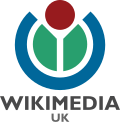Celtic Knot Conference 2018: Difference between revisions
Jump to navigation
Jump to search
Ni ddylid ddefnyddio baneri gwledydd i ddinodi ieithoedd / Country flags should not be used to denote languages |
No edit summary |
||
| Line 1: | Line 1: | ||
[[Cynhadledd Celtic Knot 2018|<big>'''Cymraeg'''</big>]] | [[Cynhadledd Celtic Knot 2018|<big>'''Cymraeg'''</big>]] | ||
[[File: | [[File:Cwlwm Celtaidd logo.png|centre|frameless|900x900px]] | ||
<center>'''The Celtic Knot Conference 2018 is the second Wikipedia language conference focusing on supporting Celtic & Indigenous Languages''' | <center>'''The Celtic Knot Conference 2018 is the second Wikipedia language conference focusing on supporting Celtic & Indigenous Languages''' | ||
Revision as of 12:52, 31 January 2018

This year the conference will be organized in collaboration between the National Library of Wales and Wikimedia UK
|
|
-
Accommodation
-
Travel
-
Registration
-
Call for papers
Objectives
The main objective for Celtic Knot 2018 is the coming together of people working to support language communities in the same room at same time; strengthening the bonds into a 'knot' and leading into action. Attendees can expect to learn about and discuss innovative approaches to open education, open knowledge and open data that support and grow language communities.
Conference Themes
- Building language confidence: participation, public engagement & social equality.
- Putting our language on the map: preserving & opening up our cultural heritage.
- Languages on the road to open: ongoing or new projects and initiatives in open knowledge, open education and open data.
- The politics of language: Local, national, and international policy and practice; advocacy for funding, institutional and community support and investment
- Hacking; making; sharing












